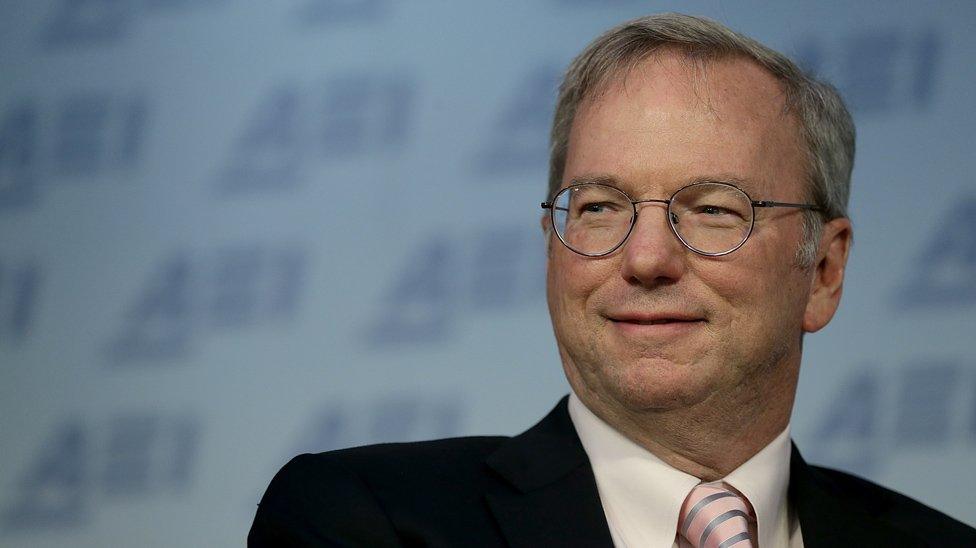Google's Schmidt - Apple is wrong about our privacy
- Published
- comments

The two giants of the tech world, Google and Apple, are battling over where we spend our time online - and Apple maintains it has a key advantage, privacy.
The company which makes huge sums from selling us hardware maintains it is far more careful with our data than Google, whose profits are based on giving advertisers detailed knowledge of our habits. But now Google's executive chairman Eric Schmidt has fired back.
"Their claims are largely false in their description of us," he said, speaking to the BBC at the Founders' Forum. This is an extraordinary gathering of many of the leading figures in technology from Europe and beyond held in a country hotel just north of London.
In a relaxed setting, CEOs of giants like Vodafone and BT rub shoulders with the founders of technology start-ups like Deep Mind and Improbable. Rather than formal presentations, there are panel discussions and fireside chats - and the highlight was Eric Schmidt.
Google's Eric Schmidt on data and privacy
He gave a ten-minute talk outlining his vision of where technology was heading, a world where computing power coupled with machine learning techniques could offer us all sorts of wonderful possibilities. He cited as an example Google's new Photos app, which is smart enough to sort through your images, recognise different categories - food, cars, mountains - and even assemble videos. Then he invited questions.
I put it to him that the world he portrayed involved all of us handing over a lot of our data and asked whether Apple had a point when it said Google was not too concerned about privacy. Having dismissed Apple's claims, he launched into an explanation of the many protections that Google offered its users.
He said the firm was very heavily regulated, both in Europe and the United States, and it would be "terrible if Google were to violate any of those things". Users had all sorts of options to delete any data that was held by the company or to use "incognito" browsing which makes it very difficult to figure out what you are up to. And he stressed that if you were still uneasy, "these services are optional". You don't have to use Google...
That of course is true. But Google's services are now so woven into our online lives that giving them up would be hard. There is also no incentive for the search company to encourage us to be more careful about what we share with theme or the the world at large. Google lives off data, and the more detailed it is the better, as its machines learn to understand everything from how languages work to what is the difference between a cabbage and a cauliflower.
So it was somewhat strange to hear Eric Schmidt say to me "We know far less about you than you think we do." Google Photos surprises me every day by unearthing photos I've taken long ago, and telling me where I was on certain dates. It seems to know a lot about me, and it is continually getting better. Using it is of course my choice - I could move to Apple Photos, but so far I'm finding the Google app much more impressive.
In answering another question, the Google chairman said his firm was not too worried about the Singularity - the idea that artificial intelligence will evolve to a state where computers become smarter than humans and are capable of continuous self-improvement. But he also said that once computers overtake humans, humans never catch up.
That may be a long way off, but as the company with more resources deployed than any other in the mission to develop artificial intelligence, Google has a responsibility to think deeply about ethics. And that means Eric Schmidt can expect many more questions about privacy and the way it handles our growing mountains of data.
You can hear more about Eric Schmidt and the privacy debate on today's edition of Tech Tent.